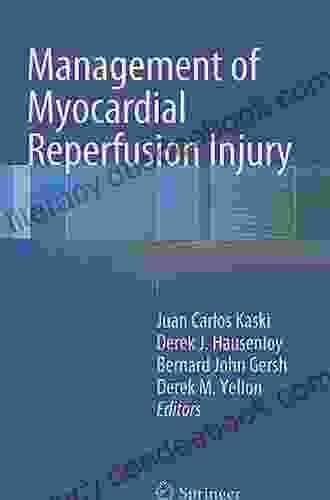Management of Myocardial Reperfusion Injury

Myocardial reperfusion injury (MRI) is a serious condition that occurs when blood flow is restored to the heart after a period of ischemia. Ischemia, or lack of blood flow, can occur due to a heart attack or other conditions that block blood vessels supplying the heart. When blood flow is restored, it can trigger a cascade of events that lead to cell death and damage to the heart muscle.
5 out of 5
| Language | : | English |
| File size | : | 6481 KB |
| Text-to-Speech | : | Enabled |
| Screen Reader | : | Supported |
| Enhanced typesetting | : | Enabled |
| Print length | : | 526 pages |
Pathophysiology of Myocardial Reperfusion Injury
The exact mechanisms of MRI are not fully understood, but several factors are thought to contribute, including:
- Oxygen free radicals: When blood flow is restored, oxygen-rich blood rushes into the ischemic area, leading to the production of oxygen free radicals. These highly reactive molecules can damage cell membranes, proteins, and DNA.
- Calcium overload: The restoration of blood flow also leads to an influx of calcium ions into the cells. This calcium overload can disrupt normal cellular processes and trigger cell death.
- Inflammation: MRI is associated with a significant inflammatory response. Inflammatory cells and cytokines can further damage the heart muscle.
Prevention and Treatment of Myocardial Reperfusion Injury
Preventing and treating MRI is crucial for improving outcomes in patients with heart disease. Several strategies can be employed:
Prevention
- Rapid reperfusion: Restoring blood flow to the heart as quickly as possible is essential to minimize the risk of MRI. This can be achieved through thrombolytic therapy (clot-busting drugs) or percutaneous coronary intervention (PCI),which involves inserting a stent to open blocked arteries.
- Ischemic preconditioning: This technique involves briefly interrupting blood flow to the heart before a prolonged ischemic event. This preconditioning can make the heart more resistant to the damaging effects of ischemia and reperfusion.
- Pharmacological agents: Several drugs have shown promise in preventing MRI, including antioxidants, calcium channel blockers, and anti-inflammatory agents.
Treatment
- Myocardial salvage: This involves preserving viable heart tissue through various interventions, such as hypothermia, cardioplegia (stopping the heart),and coronary artery bypass surgery.
- Anti-inflammatory therapies: Drugs that reduce inflammation, such as corticosteroids and statins, can help mitigate the inflammatory response associated with MRI.
- Mechanical support devices: In severe cases, mechanical support devices, such as intra-aortic balloon pumps or ventricular assist devices, may be necessary to support heart function.
Emerging Therapies for Myocardial Reperfusion Injury
In addition to the traditional approaches, several emerging therapies are being investigated for the management of MRI:
- Gene therapy: This involves introducing genes into heart cells to protect them from the damaging effects of ischemia and reperfusion.
- Stem cell therapy: Stem cells have the potential to regenerate damaged heart tissue and improve heart function.
- Nanoparticle-based therapies: Nanoparticles can be used to deliver drugs or other therapeutic agents directly to the heart.
- Remote ischemic conditioning: This technique involves briefly restricting blood flow to a limb, which has been shown to protect the heart from ischemia and reperfusion injury.
Myocardial reperfusion injury is a complex and potentially devastating condition that can occur after a heart attack or other ischemic events. Understanding the pathophysiology of MRI is crucial for developing effective prevention and treatment strategies. Current approaches focus on rapid reperfusion, pharmacological agents, and mechanical support devices. Emerging therapies, such as gene therapy and stem cell therapy, hold promise for further improving outcomes in patients with MRI. By optimizing management strategies and continuing research, we can strive to minimize the impact of MRI and improve the quality of life for patients with heart disease.
5 out of 5
| Language | : | English |
| File size | : | 6481 KB |
| Text-to-Speech | : | Enabled |
| Screen Reader | : | Supported |
| Enhanced typesetting | : | Enabled |
| Print length | : | 526 pages |
Do you want to contribute by writing guest posts on this blog?
Please contact us and send us a resume of previous articles that you have written.
 Page
Page Text
Text Story
Story E-book
E-book Magazine
Magazine Paragraph
Paragraph Sentence
Sentence Bookmark
Bookmark Glossary
Glossary Bibliography
Bibliography Preface
Preface Synopsis
Synopsis Annotation
Annotation Footnote
Footnote Scroll
Scroll Tome
Tome Bestseller
Bestseller Library card
Library card Biography
Biography Autobiography
Autobiography Memoir
Memoir Encyclopedia
Encyclopedia Thesaurus
Thesaurus Narrator
Narrator Librarian
Librarian Catalog
Catalog Card Catalog
Card Catalog Archives
Archives Research
Research Scholarly
Scholarly Lending
Lending Reading Room
Reading Room Rare Books
Rare Books Interlibrary
Interlibrary Literacy
Literacy Study Group
Study Group Storytelling
Storytelling Awards
Awards Reading List
Reading List Textbooks
Textbooks Trish Taylor
Trish Taylor Robert B Denhardt
Robert B Denhardt Daudi Abe
Daudi Abe James P Bland
James P Bland Al M Rocca
Al M Rocca Gerald Graff
Gerald Graff William Alan Webb
William Alan Webb Radiohead
Radiohead Eric Dickerson
Eric Dickerson Corrado Augias
Corrado Augias Jesse Kraai
Jesse Kraai Tim Pettingale
Tim Pettingale Aida Mollenkamp
Aida Mollenkamp Bo Hamrick
Bo Hamrick Rajan Menon
Rajan Menon Richard Schechner
Richard Schechner Rachael Johns
Rachael Johns Latricia Jones
Latricia Jones Patrick Mcnamara
Patrick Mcnamara R Crumb
R Crumb
Light bulbAdvertise smarter! Our strategic ad space ensures maximum exposure. Reserve your spot today!

 Floyd RichardsonAn Educational Story Exploring Halves, Quarters, and Eighths: A Journey...
Floyd RichardsonAn Educational Story Exploring Halves, Quarters, and Eighths: A Journey...
 Harvey BellElevate Your Drumming Proficiency: A Comprehensive Guide to Essential Skills...
Harvey BellElevate Your Drumming Proficiency: A Comprehensive Guide to Essential Skills... Mario Vargas LlosaFollow ·10k
Mario Vargas LlosaFollow ·10k Hayden MitchellFollow ·10.8k
Hayden MitchellFollow ·10.8k Roland HayesFollow ·4.5k
Roland HayesFollow ·4.5k Steve CarterFollow ·11.6k
Steve CarterFollow ·11.6k Victor HugoFollow ·5.3k
Victor HugoFollow ·5.3k Spencer PowellFollow ·5.9k
Spencer PowellFollow ·5.9k H.G. WellsFollow ·17.7k
H.G. WellsFollow ·17.7k Dillon HayesFollow ·11.3k
Dillon HayesFollow ·11.3k

 Al Foster
Al FosterHow To Breathe Underwater: Unlocking the Secrets of...
: Embracing the...

 Ian Mitchell
Ian MitchellThe Laws of Gravity: A Literary Journey into the...
Lisa Ann Gallagher's...

 Francis Turner
Francis TurnerChristmas Solos For Beginning Viola: A Detailed Guide for...
Christmas is a time for...

 Jamal Blair
Jamal BlairDefine Humanistic Psychology Forms Of Communication...
Humanistic...

 Morris Carter
Morris CarterJudgment in Berlin: Unraveling the Intrigue of an...
"Judgment in Berlin" is a gripping...
5 out of 5
| Language | : | English |
| File size | : | 6481 KB |
| Text-to-Speech | : | Enabled |
| Screen Reader | : | Supported |
| Enhanced typesetting | : | Enabled |
| Print length | : | 526 pages |










